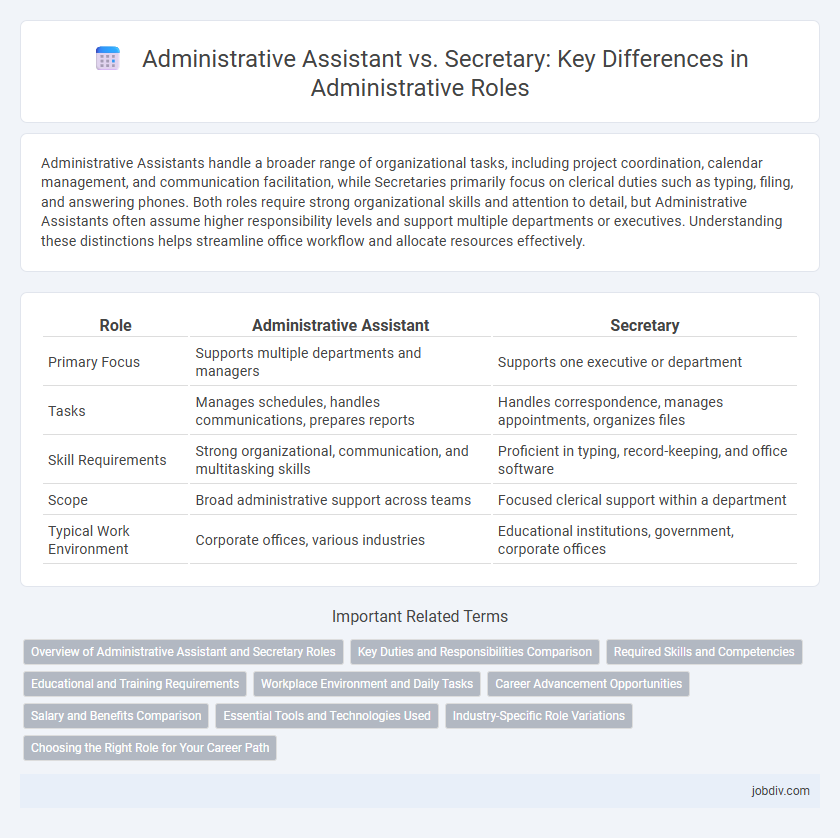Administrative Assistants handle a broader range of organizational tasks, including project coordination, calendar management, and communication facilitation, while Secretaries primarily focus on clerical duties such as typing, filing, and answering phones. Both roles require strong organizational skills and attention to detail, but Administrative Assistants often assume higher responsibility levels and support multiple departments or executives. Understanding these distinctions helps streamline office workflow and allocate resources effectively.
Table of Comparison
| Role | Administrative Assistant | Secretary |
|---|---|---|
| Primary Focus | Supports multiple departments and managers | Supports one executive or department |
| Tasks | Manages schedules, handles communications, prepares reports | Handles correspondence, manages appointments, organizes files |
| Skill Requirements | Strong organizational, communication, and multitasking skills | Proficient in typing, record-keeping, and office software |
| Scope | Broad administrative support across teams | Focused clerical support within a department |
| Typical Work Environment | Corporate offices, various industries | Educational institutions, government, corporate offices |
Overview of Administrative Assistant and Secretary Roles
Administrative assistants handle broader office management tasks including scheduling, communication coordination, and project support, while secretaries primarily focus on clerical duties like typing, filing, and answering phones. Administrative assistants often possess advanced organizational skills and may manage team workflows, whereas secretaries typically provide direct support to executives or departments. Both roles require strong communication abilities and proficiency in office software, but administrative assistants generally have expanded responsibilities beyond traditional secretarial functions.
Key Duties and Responsibilities Comparison
Administrative Assistants manage complex scheduling, correspondence, and project support, ensuring efficient office operations and stakeholder communication. Secretaries primarily handle clerical tasks such as document preparation, answering calls, and organizing files to maintain administrative order. Both roles require strong organizational skills, but Administrative Assistants often engage in higher-level administrative functions and decision-making support.
Required Skills and Competencies
Administrative Assistants require strong organizational skills, proficiency in office software, and the ability to manage schedules efficiently. Secretaries must have excellent communication skills, attention to detail, and expertise in document preparation and filing systems. Both roles demand multitasking capabilities and a professional demeanor to support executive and team functions effectively.
Educational and Training Requirements
Administrative Assistants typically require a high school diploma or equivalent, with many employers preferring candidates who have completed postsecondary certificates or associate degrees in office administration or related fields. Secretaries often share similar educational requirements but may benefit from specialized training in shorthand, typing, and specific industry-related software to handle more targeted clerical tasks. Both roles prioritize strong organizational skills and proficiency in communication tools, yet Administrative Assistants usually receive broader training in office management and technology applications.
Workplace Environment and Daily Tasks
Administrative assistants often manage complex scheduling, coordinate meetings, and handle communication across multiple departments, contributing to a dynamic workplace environment. Secretaries typically focus on clerical duties such as typing, filing, and managing correspondence, supporting a more structured office setting. Both roles require strong organizational skills, but administrative assistants tend to engage in broader project management and decision-making tasks.
Career Advancement Opportunities
Administrative assistants often have broader career advancement opportunities compared to secretaries due to their involvement in project management, technology use, and decision-making support within organizations. Secretaries typically perform more routine clerical tasks, which may limit their upward mobility unless they acquire additional skills or certifications. Gaining expertise in software applications, communication, and organizational skills significantly enhances career progression prospects for administrative assistants.
Salary and Benefits Comparison
Administrative Assistants typically earn a median annual salary of $40,000 to $50,000, while Secretaries average slightly lower, around $35,000 to $45,000, depending on industry and location. Benefits for Administrative Assistants often include comprehensive healthcare, retirement plans, and professional development opportunities, whereas Secretaries may receive more basic benefits packages with fewer advancement perks. Job responsibilities influencing compensation include higher administrative duties and software proficiency required for Administrative Assistants compared to traditional clerical tasks handled by Secretaries.
Essential Tools and Technologies Used
Administrative Assistants utilize advanced project management software, cloud-based scheduling tools, and communication platforms like Microsoft Teams to streamline workflow and enhance collaboration. Secretaries primarily rely on document management systems, traditional desktop office suites such as Microsoft Office, and phone systems to manage correspondence and scheduling. Both roles increasingly depend on automation tools and digital calendars to improve efficiency and accuracy in daily administrative tasks.
Industry-Specific Role Variations
Administrative assistants often handle a broader range of tasks, including project management, data analysis, and communication coordination, tailored to industries like healthcare, finance, or technology. Secretaries typically focus on clerical duties such as scheduling, correspondence, and filing, with variations found in legal firms, educational institutions, and government offices. Industry-specific role variations influence the required skills, with administrative assistants needing proficiency in specialized software, while secretaries may emphasize strong organizational and interpersonal abilities.
Choosing the Right Role for Your Career Path
Selecting between an Administrative Assistant and a Secretary hinges on your desired career growth and skill set specialization. Administrative Assistants often handle a broader range of tasks including project coordination, communication management, and office organization, making it ideal for those seeking diverse responsibilities and advancement opportunities. Secretaries typically focus on clerical duties such as scheduling, correspondence, and record-keeping, suited for individuals preferring a structured, supportive role within a specific department.
Administrative Assistant vs Secretary Infographic

 jobdiv.com
jobdiv.com